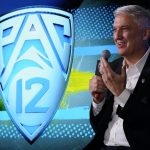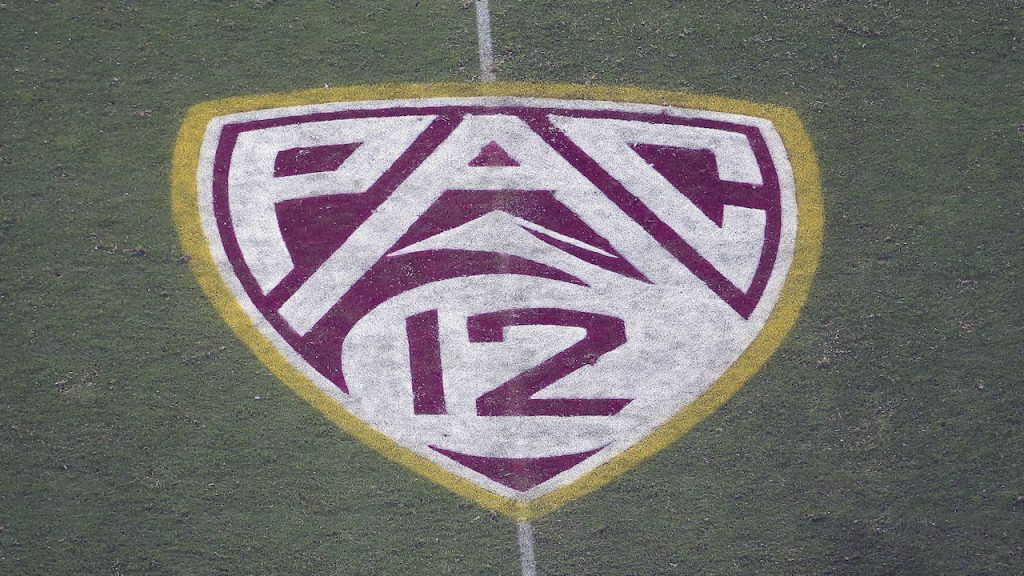The remaining Pac-12 schools are sticking together, not leaving for the Big 12 or Big Ten. Expansion of the playoff could change the financial calculus of realignment, and UCLA will lose money by going into the Big Ten.
Those were among the insights offered by Pac-12 commissioner George Kliavkoff in his first public comments in two months as he works to craft a media rights contract that meets the needs of the 10 universities remaining in the conference.
“I think (they) will sign a grant-of-rights agreement if we put the right agreement in front of them, which is why we’re spending so much time focused on getting an agreement that will allow all of our schools not just to compete but to thrive,’’ Kliavkoff said during his appearance Monday evening on ‘Canzano and Wilner: The Podcast.’
In his first interview since Pac-12 football media day on July 29, Kliavkoff declined to provide a specific timeline for a broadcast agreement or address potential network partners in the aftermath of USC and UCLA. (ESPN and Amazon are believed to be interested in Pac-12 football and basketball.)
He also stood by his comments from July that the so-called Four Corners schools (Arizona, ASU, Colorado and Utah) weren’t planning to jump into the Big 12.
“I don’t feel, candidly, any sense of urgency at this point,’’ he said of completing a media deal. “No one’s going anywhere; we’re all together; we’re focused on doing this.”
When asked to respond to a media report last week that the Pac-12 and ESPN were “hundreds of millions of dollars apart,” Kliavkoff noted the series of attempts to “destabilize” the conference since June 30, when USC and UCLA announced their departures to the Big Ten.
“At this point, our 10 schools are completely focused on the future and being together … It’s now almost a running joke at our board meetings: ‘What’s the latest nonsense that someone has thrown against the wall and seeing whether someone will report?”’
— The timeline for potential Pac-12 expansion
— His reaction to the Big Ten’s media rights deal
— The future of the Pac-12 Networks
— The impact of College Football Playoff expansion
— His relationships with Big 12 commissioner Brett Yormark and the Big Ten’s Kevin Warren
Kliavkoff offered a detailed assessment of UCLA’s planned move to the Big Ten in the summer of 2024, which is a topic for discussion at the University of California’s Board of Regents meeting on Thursday.
Several regents, including Gov. Gavin Newsom, have expressed concern about the impact of the move on the athletes and on Cal’s annual revenue from the Pac-12.
According to the UC general counsel, Charlie Robinson, the regents have the authority to revoke UCLA’s move. Whether they plan to act on that right is unclear.
“There’s a couple of key reasons why we think overturning the decision would not be a bad idea,’’ Kliavkoff said.
He cited the mental and physical impact of cross-country competitions on the players and the increased travel and administrative costs associated with Big Ten membership.
“We think the incremental money they are going to receive from the Big Ten’s media rights deal will be more than 100 percent offset by additional expenses, so you end up taking the money you earned and it goes to airline and charter companies and coaches and administrators,’’ Kliavkoff said.
“It doesn’t go to supporting the student-athletes. And obviously, there’s the negative impact on Cal that I’m sure the regents will take into account when they are considering this.”
(UCLA did not immediately respond to a request for comment.)
Without campuses in the massive Los Angeles market, the Pac-12’s media revenue could be cut by $10 million per school (or more) in the next contract cycle.
But according to sources, UCLA has run the numbers and believes membership in the Big Ten will be a financial boon for the debt-strapped athletic department.
The Bruins expect to receive approximately $70 million annually in media rights revenue in their new home, in addition to significant shares of postseason revenue.
Exactly how much they would collect staying in the Pac-12 is debatable. Some industry sources believe it could be $35-40 million; others believe it would be more.
Would the added travel and administrative expenses offset the $25 million (approximately) disparity? The cost of chartered flights for all UCLA teams likely would not exceed $10 million.
The unknown in any financial projection is the potential for the UC regents to require the Bruins to subsidize Cal for the lost media rights revenue.
While such a move would be unprecedented in the UC system — and seems unlikely — it cannot be dismissed given comments last month during the regents’ meeting at UCLA.
“I’m very concerned about the financial impact to Cal-Berkeley,” regent Tony Thurmond, “and to make sure whatever new revenue might be achieved” — by UCLA’s membership in the Big Ten — “envisions a scenario to help offset (Cal’s) need.”
Kliavkoff did not divulge specifics of the financial modeling at the heart of his conclusion.
“We are sure they are financially better off staying,” he said, “and we are sure there was no other criteria in the decision, other than financial.
Support the Hotline: Receive three months of unlimited access for just 99 cents. Yep, that’s 99 cents for 90 days, with the option to cancel anytime. Details are here, and thanks for your support.
*** Send suggestions, comments and tips (confidentiality guaranteed) to pac12hotline@bayareanewsgroup.com or call 408-920-5716
*** Follow me on Twitter: @WilnerHotline
*** Pac-12 Hotline is not endorsed or sponsored by the Pac-12 Conference, and the views expressed herein do not necessarily reflect the views of the Conference.
Related posts:
 Hotline mailbag – On the “big bias” with ESPN, the Pac-12’s low bid total, Kriisa’s injury, Fox and Haase remain in place and more
Hotline mailbag – On the “big bias” with ESPN, the Pac-12’s low bid total, Kriisa’s injury, Fox and Haase remain in place and more

(AP Photo/Ralph Freso, File)
Wilner Hotline – Pac-12 survival guide: The strategic merits of an alliance (or merger) with the Big 12
(AP Photo/Ralph Freso, File)
Wilner Hotline – Presidential Power Index: Which Pac-12 presidents have the greatest influence over the conference’s future
(AP Photo/Marcio Jose Sanchez)
Wilner Hotline – The Pac-12’s survival depends on the Big Ten, not the Big 12: Tracing the path to stabilityJon Wilner
Jon Wilner has been covering college sports for decades and is an AP top-25 football and basketball voter as well as a Heisman Trophy voter. He was named Beat Writer of the Year in 2013 by the Football Writers Association of America for his coverage of the Pac-12, won first place for feature writing in 2016 in the Associated Press Sports Editors writing contest and is a five-time APSE honoree.
